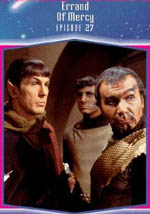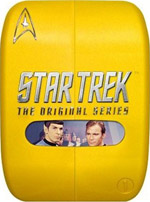Errand of Mercy

|
This story is one of the most interesting of the first season,
and quite archetypal for original Star Trek. There are some
highly satisfying characterizations here and the story feels
like a particularly BIG event for the Trek universe.
However, there are at least two significant problems as well,
eating at the adventure's rank.
Chief amongst the story's strengths is its introduction of the Klingons,
led here by actor John Colicos (Baltar from the original
Battlestar Galactica). This is another example of "world building"
in the Star Trek universe, nearly on par with
"Balance of Terror",
yet not quite supplying as much information... and indeed some
of the information we do get seems to have changed in later years.
Still, the Klingon Empire gets good definition here, perhaps resembling
the American perception of the Soviet Union a little more closely
than Klingons do today.
|
The story's first major blunder only has relevance in hindsight. The society
that Starfleet observes on Organia initially appears to be humanoids at
a pre-warp level of technology. Starfleet's Prime Directive will eventually
be very clear that this means they should not approach, greet, interact,
or in any way make their existence known to the Organians. It seems very bizarre
to us now that this non-interference Prime Directive was mentioned previously in
"The Return of the Archons",
yet is not remotely in the thoughts of Kirk and
company during the lengthy section of planning their approach to Organia,
or in their initial dealings with the council. In fact, Kirk basically
offers them huge technological boosts, education included, which is a serious
violation of what should be one of his strongest principles.
Now of course, writer Gene Coon knows exactly where he's heading with this,
and it's a worthy place - very reminiscent of many of his other stories in fact,
yet with its own unique embellishments.
But as audience members, we may find ourselves
a bit distanced from Kirk and company, as we see his missteps and become
reluctant to root for him as fully as we are accustomed to do.
Perhaps it should also be noted that Klingons were most often utilized as the
feared force causing Starfleet to break their own Prime Directive all throughout
season two. The narrative in "Errand of Mercy" seems to fit the same pattern....
yet unlike "The Return of the Archons", no mention of the Prime Directive is tacked
on as though in hindsight, leaving what now seems to be an inconsistency in
the Star Trek universe. Sure, it is later discovered that the Prime Directive
shouldn't apply, but the Enterprise crew very clearly don't know this as they get
involved, and it does seem bizarre that they are not even mentioning it as they
plan their moves.....
Should the threat of the Klingon presence be justification for swapping
out the Prime Directive for the kind of guided self-determined protected-colony
status that Kirk offers the Organians? I'd feel much better about the episode
and more invested in the characters if this had at least been discussed or debated
in the Enterprise crew's earlier planning scenes in the episode, even if they
were unable to agree on what was truly best.
Alternatively, this episode could be taking place in a vacuum where MOST of the
Prime Directive as we would see in season two has not yet been adopted
by Starfleet. If they'd discussed something of it, somewhere, maybe we would know.
As it stands, long term fans have to guess, and "read between the episodes",
as it were.
The second big problem in this story is the sheer amount of discussion
that the Organians engage in without being able to explain their own stance
properly. I don't feel like we got sufficient reason for them to hold back
the truth about who they are for such a long period of time. Most of their
dialogue is just frustratingly awkward. Do they intend to explain it all to
Kirk, if only he would stop bombarding them with distracting questions and
offers and concerns? Or did they deliberately intend to keep their true nature
secret? If so, what was the point? At any rate, Kirk comes off as a bad listener,
and the Organians as bad speakers. Not great.
These two problems really make one question Kirk's purpose on the planet,
and significantly lower our enjoyment of the episode on repeat viewings.
Investment in our lead protagonists is a little too dependent on not knowing
where the episode, and the franchise, is heading.
That said, John Colicos truly shines in his role as Kor, and along with his
subordinates, the Klingon race stood out as the most successful element
of this episode. Note they are also easily the most honest element of the
script as well. I keep remembering the pride Gene Roddenberry had during
one of the bonus feature interviews, when he claimed that Kirk and Spock
never lied. Ha! Both they and the Organians are pretty prolific with
their lies and their withholding of truth here.
The episode has some good action to it, a space battle early on, a large
pyrotechnic display shortly after, a phaser/fisticuffs battle near the end,
all of which are pretty good. The episode's pace also moves along quite well.
We get the pleasant bits involved with prisoner dynamics and duress,
while the Organians refreshingly cut short the unpleasant and boring bits
usually associated with these dynamics,
substituting escalations in the story's primary mystery - a great trade-off in my
opinion.
And the final portions of the story also work well, with an entertaining effect
for the Organians' transformation, all truths revealed, and a quite unique
method for achieving an end to hostilities. One knows from future episodes
that there will be an Organian Peace Treaty governing Federation/Klingon
interaction moving forward. One wonders, however, exactly what kind of
relations the Organians would maintain with the Federation, or the Klingons
for that matter.
If anything's missing in terms of action and effects, it's definitely
the lack of optical shots of Klingon spacecraft in the original versions
of the episodes. In fact, original Star Trek committed a real crime
by bringing the Klingons back quite often in season two, but not giving
them a proper spacecraft until season three. This is one case where I think
more modern CGI updates can make a legitimate argument for improving
the episode.
As usual, the coda for a Star Trek episode attempts to pull everything back into
perspective and give us an optimistic framing for the story. We may have been
disappointed with aspects of Kirk's approach today, but Kirk himself is also
quite "embarrassed" by his own showing, which is markedly unusual. This seems
to be an important moment for Kirk to win back whatever audience support he
may have lost earlier, and it works fairly well in that regard.
At any rate, this is a good episode, which I still enjoy quite a bit today,
however its two big problems will hold it back a bit while a good many other episodes
rank higher.
Read the next Star Trek review:
"Operation -- Annihilate!"
|
|















